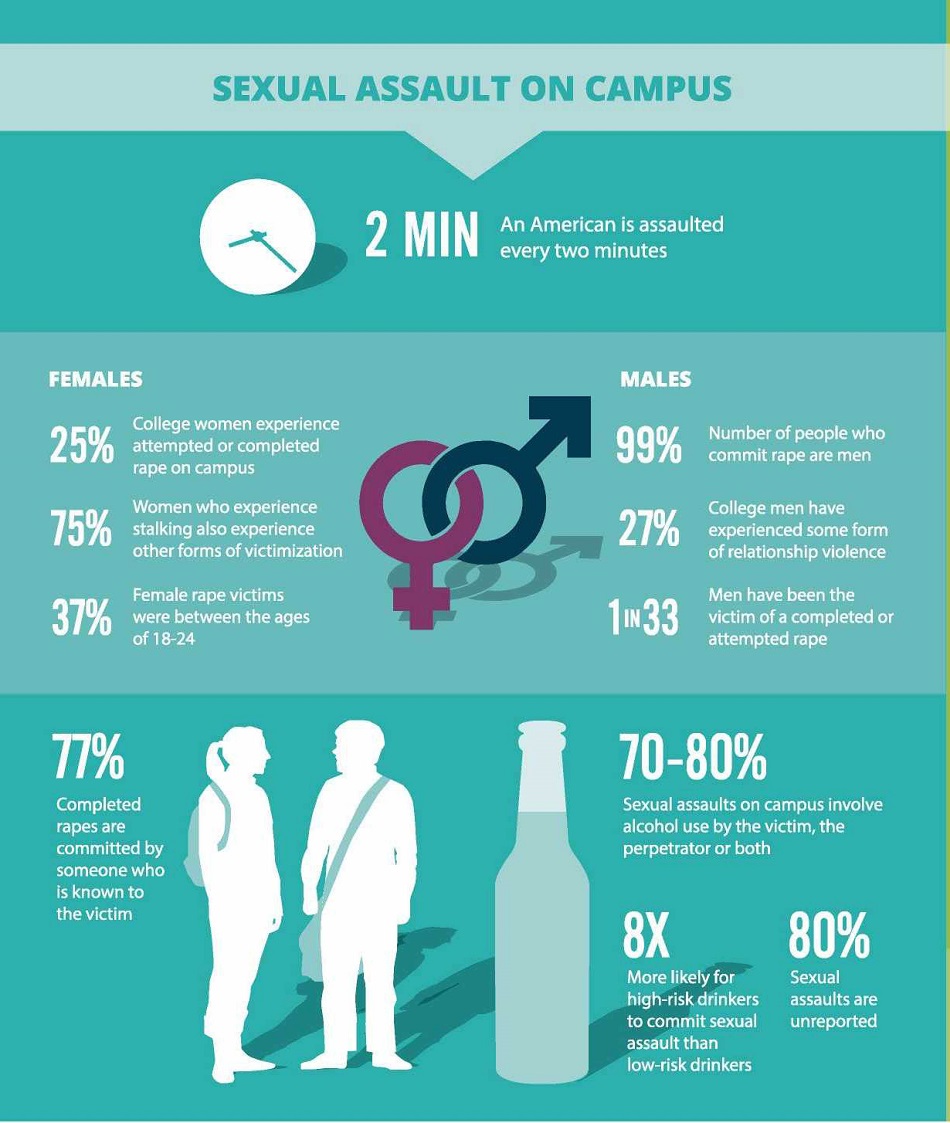
Sexual Assault Awareness On Campus
Campus safety concerns all students, and one of the most disquieting dangers young adults must face is the risk of sexual assault. In April 2014, the White House Task Force to protect students from sexual assault released their report. The report led with a chilling statistic that one in five college student’s experiences sexual assault during their college career.
According to the ACLU 95% of U.S. campus rapes go unreported. The problem of under-reporting reflects an extreme need for increased campus prevention and support systems. The federal government has stepped up to the task. Thenot alone project, backed by President Obama and Vice President Biden, strives to break the silence about sexual violence on college campuses and reach out to provide victims with the supports and avenues they need to reclaim justice, security and a sense of well-being after an attack.
This article aims to increase awareness about sexual assault and abusive partner relationships, address tactics to prevent sexual attacks on campuses, and what you should do if you or someone you know is assaulted.
Defining Sexual Assault
Sexual assault is an umbrella term used to describe a wide range of forced and unwanted sexual activity, including exhibitionism, kissing, and rape and groping. The victims are coerced into sexual acts through verbal or non-verbal threats or through the use of substances such as drugs or alcohol. Sexual assault does not always involve physical contact. Acts such as exhibitionism and voyeurism can still count as unwanted sexual attention.
Image credit: Haven
Most victims know their rapist or assailant. According to the Rape, Abuse and Incest National Network, two out of three sexual assaults are committed by an attacker that the victim knows. About 38% of rape incidents are committed by a friend or acquaintance of the victim. Location and time can play a role in sexual assault and rape trends. The homes of victims or perpetrators are the most likely location of a rape or sexual assault.
Most sexual assault incidents go unreported, partially due to different social stigmas experienced by men and women who are victims of these crimes. Survey shows that about 60% of victims do not go to police and only 25% of reported assaults actually lead to an arrest. According to the National Institute of Justice, other factors that prevent women from reporting attacks include, fear of blame and distrust of authorities.
Survey shows that men are also victimized, with about 10% of sexual assault incidents involving attacks against men. The support organization, Male Survivor describes how male victims face different types of stigma involving stereotypes of machismo, toughness and lack of vulnerability. Such societal misconceptions prevent men from reporting unwanted sexual activity.
Recognizing Abuse
College provides an environment for many students to explore intimate relationships with casual partners or serious relationships. However, in the confines of these relationships, inexperienced partners may not have the tools and experience needed to identify troubling behaviors. The earliest expressions of abuse are not always physical. Controlling habits can begin with manipulative comments or angry outbursts either in-person or over phone, text or social media.
It is important for young adults to recognize warning signs of a problematic relationship, before an abusive situation escalates. Below are some of the common indicators of high-risk physical or emotional abuses:
Emotional Abuse
- Tone – seemingly harmless statements can transform into threats or insults if your partner uses a reproachful or aggressive tone.
- Language Choice – your partner blames you for things or uses coarse language such as swear words, while speaking to you.
- Jealousy - Your partner seems suspicious of your interactions with other people. Your partner attempts to control your interactions, isolate you, or monitor your communications with others.
- Controlling Statements - Your partner issues commands or often says you "must†or "have to†do something.
- Pejorative Language – your partner addresses or describes you with insulting names or adjectives, such as ‘idiotic’ or ‘stupid’.
- Threats - Your partner attempts to control you with "or else†statements or negative consequences if you do not comply with their wishes. Your partner might threaten you with physical, emotional, or verbal abuse.
Physical Abuse
- Violence – your partner uses unwanted and forceful contact. This can include anything from wrist grabs to strikes against your body.
- Threatening body language – your partner uses forceful movements, such as lunging toward you, glaring at your or aggressively invading your personal space.
- Damaging Property – your partner loses their temper and damages items around the house, such as smashing dishes.
- Violence During Sex – Your partner is extremely forceful or even violent during sex.
Survey shows that over 40% of college women experience some form of violent or abusive behavior while dating.
Prevention
There are a number of ways to both reduce your chances of becoming a victim. For example, a report by the National Institute of Justice reveals that self-protection actions such as running, hiding, getting help, weaponless attacking or struggling seem to decrease the risk of rape completion by 80%. Most colleges offer personal development courses in basic self-defense. If you cannot find one on campus, explore nearby gyms and dedicated martial arts studios to learn about their training options.
Basic Safety Guidelines
- Know Your Alcohol Limits – research at Wayne State University shows that over half of sexual assaults committed against college students involve alcohol. Intoxication can make you significantly more vulnerable to assaults by impairing your judgment or inhibiting your physical ability to fight off an attacker. Binge drinkers are at a particularly high-risk of suffering incapacitation, blackout or unconsciousness.
- Watch Your Drinks – Never leave your drink unattended. In addition, never drink a beverage given to you by someone else or taken from a communal alcohol source.
- Listen To Your Gut - If you get a bad feeling about a location or a person, leave immediately. We often subconsciously process body language and other danger indicators without realizing it. If something feels very wrong or you feel pursued, head in the direction of the nearest crowd, lighted area or building. Start talking loudly on your phone. Many attackers are unwilling to pursue victims who are aggressive or loud, which draws attention to the crime.
- Stick With Your Friends - Attend social gatherings with a group of friends that you trust. Look out for each other and help each other arrive home safely. If you do go out alone, always tell someone where you are going and avoid walking in dark parts of town or campus.
What You Should Do After An Assault
Sexual assault can take an immeasurable toll on the victim’s physical and mental health. Research shows that only 25-50% of survivors seek professional mental health help after a sexual assault. The emotional and physical scars of an assault can deeply impact a student’s ability to cope with academic, personal and social responsibilities. While asking for help may feel unbearable, you must take action to ensure your safety.
Immediate Steps To Take
- Get To A Safe Place - Get away from your assailant to a location where you can call for help. Ideally, find a secure place where you are not alone. This can include a campus health center, or the home of a nearby friend or family member.
- Contact The Authorities - Call 911 to report the incident right away. Provide the dispatcher with the time, place, and description of your assailant. Wait for the police to arrive so that they can collect your statement.
- Get Medical Attention - Even if you do not feel like you need to, seek medical attention at a doctor’s office, urgent care clinic or a hospital as soon as possible. Doctors can help collect vital evidence and treat your injuries directly after an assault. These are some of the specialized care options to ask for:
- Advocacy – you can call the National Sexual Assault Hotline to request for hospital referrals and check for the availability of an emergency advocate.
- Sex Assault Nurse/ Forensic Examiner – these professionals are trained to conduct victim examinations, collect DNA evidence and document injuries that can prove useful in identifying an assailant.
- Emergency Contraception – victims can prevent pregnancy risk by taking a contraceptive up to 120 hours after an attack.
- STD Testing – get screened for possible infections that transmitted during nwanted sexual contact.
If Someone You Know Is Assaulted
- Help the victim reach a safe location away from the assailant. Make the victim feel as safe and listened to as possible.
- Most victims blame themselves. Inform the victim that the sexual assault was not their fault.
- Be a supportive listener. Thank the victim for telling you about the incidence. Avoid phrases that evoke powerlessness at first, including "I’m sorry.â€
- If you saw the attacker or witnessed any part of the assault, take detailed notes regarding the incident.
- Accompany the victim to the hospital and ensure they meet with medical professionals who specialize in sexual assault trauma.
- Follow up with the victim. Encourage participation in counseling sessions and support groups.
- Watch the victim’s emotional and physical status. Sexual assault victims are at a higher risk for mental health issues such as depression, PTSD, eating disorders or suicidal ideations.
Recovery After An Assault
Survivors often struggle with resuming their normal daily activities in the aftermath of a sexual assault. Work with your physicians, counselors, and instructors to take the appropriate time off from classes and other academic responsibilities and heal. Even after physical wounds heal, survivors suffer the risk of chronic emotional distress.
Physical After Effects
- Jitteriness
- Disrupted sleep patterns
- Muscle cramps or spasms
- No libido
- Aching at injured parts
Emotional After Effects
- Anxiety
- Self-blame or guilt
- Rage
- Helplessness
- Emotional outbursts
- Constant worry
Mental After Effects
- Inability to concentrate
- Depression
- Denial
- PTSD
- Suicidal ideation
Conclusion
Due to the seriousness of trauma that often comes with the fallout of an attack, it is extremely important for victims of sexual abuse to get professional help. You might not feel like you need counseling, however the emotional and mental after effects can suddenly catch up with you, especially during periods of high stress in your life as a student. There are many support systems in place to help you through this difficult period.
For college students, attending university is supposed to represent a time to gather knowledge and build the foundations for tomorrow’s successes. It is not a time where sexual violence is a commonplace.

